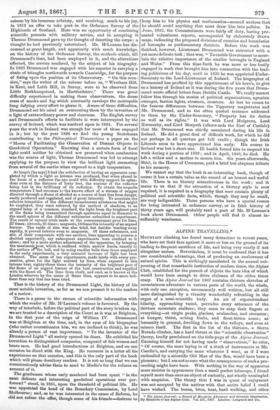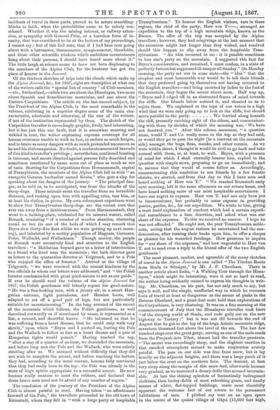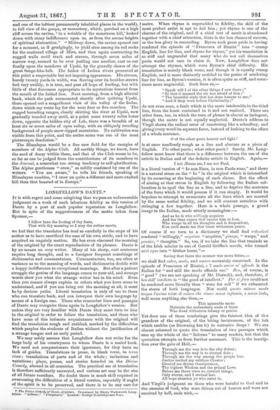ALPINE TRAVELLING.*
Moummiar climbing has found many detractors in recent years, who have set their face against it more or less on the ground of its leading to frequent sacrifices of life, and being very nearly if not altogether useless. Nevertheless, it must be confessed that it has one considerable advantage, that of producing an exuberance of animal spirits. This is strikingly manifested in the annual out- pouring of that remarkable institution of modern times, the Alpine Club, established for the pursuit of objects the bare idea of which would have been enough to drive clubmen of the olden times crazy. The Alpine Journal for 1867 contains thirteen sketches of mountainous adventure in various parts of the world, the whole, with only one exception, uncommonly well written, but all still more distinguished by a vivacity wonderfully refreshing in the organ of a semi-scientific body. An air of superabundant hilarity, approaching vaunt, pervades every utterance of the thirteen mountain stalkers ; they seem to snap their fingers at everything—at virgin peaks, glaciers, avalanches, and crevasses ; at hunger, thirst, aching limbs, and frost-bitten noses ; at humanity in general, dwelling down in the valleys, and even at science itself. The first in the list of the thirteen, a Sierra Nevada climber, has a hard thrust at the "scientific observation" theory, loudly proclaimed on the title-page of the Alpine Journal. Excusing himself for not having made " observations," he cries, " Of course, the mere laying in of a stock of instruments at Mr. Casella's, and carrying the same wherever I went, as if I were enthralled by a scientific Old Man of the Sea, would have been a pleasure ; but I am not so sure what the consequences of such a pro- ceeding might have been. With nothing in the way of apparatus more sinister in appearance than a small pocket telescope, I found myself more than once an object of curiosity, not wholly uumingled with suspicion. The theory that I was in quest of enjoyment was not accepted by the natives with that entire belief I could have wished. The burns, bites, heat, hard walking, and other
• The Alpine Journal : a Record of Mountain Adventure and Scientific Observation. By Members of the Alpine Club. Vol. 111., 18137. London: Longman end Co.
incidents of travel in these parts, proved to be severe stumbling- blocks to faith, when the probabilities came to be calmly con- sidered. Whether it was the mining interest, or railway exten- sion, or sympathy with General Prim, or a harmless form of in- sanity, that was considered to be at the bottom of my proceedings, I cannot say ; but of this feel sure, that if I had been seen going about with a barometer, thermometer, sympiezometer, theodolite, and those other scientific trinkets which ambitious mountaineers hang about their persons, I should have heard more about it." The little laugh at science seems to have not been displeasing to the members of the Alpine Club, for the banterer has got the place of honour in the Journal.
Of the thirteen sketches of trips into the clouds which make up the Alpine Journal, &c., for 1867, eight are descriptive of what one of the writers calls the " special line of country " of Club members, —viz., Switzerland,—while two are about the Himalayas, two more about Spanish and Scandinavian mountains, and one about the Eastern Carpathians. The article on the last-named subject, by the President of the Alpine Club, is the most remarkable in the volume, exhibiting in a superior degree some of the main cha- racteristics, admirable and otherwise, of the rest of the writers, if not of the institution represented by them. The sketch of the Carpathian traveller is exceedingly graphic, lively,''and interesting, but it has just this one fault, that it is somewhat sneering and unkind in tone, the writer expressing supreme contempt for all human creatures unable to walk as fast, to endure as much fatigue, and to brave as many dangers with as much pretended unconcern as he and his club companion. No doubt, a moderateamountof bravado of this kind is traveller's privilege ; nevertheless, continued boasting is tiresome, and sneers directed against persons fully described and sometimes mentioned by name seem out of place as much as out of taste. Starting for the Carpathians from Hermannstadt, capital of Transylvania, the members of the Alpine Club fell in with " an energetic German bookseller named Krebs," who gets a slap for speaking about the dangers of the journey. " The principal dan- ger, as he told us, to be anticipated, was from the attacks of the sheep-dogs. These animals scent the traveller from an incredible distance, and rushing upon him with appalling cries, tear him, or at least his clothes, in pieces. My own subsequent experience went to show that Transylvanian sheep-dogs are the veriest curs that ever ran away from a fictitious stone." From Hermannstadt, they went to a bathing-place, celebrated for its mineral waters, called Borszek, consisting " of a number of wooden shanties, clustering round an inn (in one of the beds of which I may remark that Bryce slew thirty-five fleas whilst we were getting up next morn- ing), and inhabited by a motley population of Magyars, Germans, Poles, Wallacks, and Wallachians." Though motley, the people at Borszek were excessively kind and attentive to the English travellers : " a Moldavian boyard gave us a letter of introduction to a friend who lived near the mountain ; the bath director gave us letters to the quarantine director at Tolgyesch, and to a Pole who enjoyed the office of forester." Arrived at the village of Tolgyesch, " we were received with the utmost kindness by the two officials to whom our letters were addressed," and " the Polish forester condescended with great good-nature to act as our guide." If ever he should read the volume of the Alpine Journal for 1867, the Polish gentleman will bitterly repent his good-nature. " He was a fine-looking man, with a jaunty air, in a smart Hun- garian costume, tight pantaloons, and Hessian boots, well adapted to set off a good pair of legs, but not particularly suitable for mountaineering." In the long account of the ascent of the mountain which follows, the Polish gentleman, as well described outwardly as if mentioned by name, is represented as a liar, a coward, and deceitful knave. " He informed us that he was suffering from a heart disease, that he could only walk very slowly," upon which "Bryce and I pushed on, leaving the Pole and the Wallack to follow as fast as a heart disease and a pair of Hungarian tights would permit." Having reached the top, " after a stay of a quarter of an hour, we descended the mountain, and before long met the Pole and the Wallack, who were calmly strolling after us. We assumed without difficulty that they did not wish to complete the ascent, and before reaching the bottom they had, according to the usual custom, become fully convinced that they had really been to the top ; the Pole was already in the state of high spirits appropriate to a successful ascent. He now became really anxious to meet the robbers, and declared that three brave men need not be afraid of any number of rogues."
The conclusion of the journey of the President of the Alpine Club is almost painful to read. Having taken "an affectionate farewell of the Pole," the travellers proceeded to the old town of lironstadt, where they fell in " with a large party of hospitable
Transylvanians." To honour the English visitors, rare in these regions, the chief of the party, Herr von T—, arranged an expedition to the top of a high mountain ridge, known as the Bucses. The offer of the trip was accepted by the Alpine travellers ; however, they had misgivings at the last moment that the excursion might last longer than they wished, and resolved should this happen to slip away from the hospitable Tran- sylvanians. " Au idea occurred to me : it is possible sometimes to lose one's party on the mountain. I suggested this fact for Bryce's consideration, and remained, I must confess, in a state of perfectly furious but suppressed ill-temper all Sunday." On Monday morning, the party set out in some state—the " idea " that the simplest and most honourable way would be to tell their friends that they preferred going by themselves not having occurred to English travellers—and being escorted by ladies to the foot of the mountain, they began the ascent about noon. Half way up, "Bryce and I edged off in an abstracted, frame of mind towards the cliffs. Our friends below noticed it, and shouted to us to rejoin them. We explained at the tops of our voices in a high wind that we were only going up to look at the cliffs, but should
move parallel to the party We hurried along beneath the cliff, presently catching sight of the others, and communicat- ing with them by shrieks, of which the meaning was, We have not deserted you." After this solemn assurance, " a question arose, would T. and Co. really come to the top as they had said,. or would they go to pass the night [in a convent on the mountain side] amongst the bugs, fleas, monks, and other vermin. As we were within shout, I thought it would be civil to go back and take counsel with them, or, at least, to wait. Bryce, with a presence of mind for which I shall eternally honour him, replied to the question with simple scorn, proposing to go on immediately, and to assume that they would of course follow us. Accordingly, communicating this resolution to our friends by a few frantic shrieks, we started, and from that day to this I have seen and heard nothing of Herr von T." " We reached Kronstadt early next morning, left it the same afternoon on our return home, and have heard nothing more of our most hospitable entertainers. I have one regret to express. Herr von T. had not only been put. to inconvenience, but probably to some expense in providing ponies, guides, &c., for our expedition. We wrote to him, giving a most lucid explanation of conduct which had a certain superfi- cial resemblance to a base desertion, and asked what was our share of the expenses. To this we received no answer. I hope he was not offended." He ought not, the poor Transylvanian noble- man, seeing that the august visitors he entertained had the con- descension, after turning their backs upon him, to offer a cheque as plaister for his wounded feeelings. How generous to inquire for " our share of the expenses," and how ungrateful in Herr von T. not to send even a reply to the liberal offer of the two English gentlemen I
The most pleasant, modest, and agreeable of the many sketches. of travel in the Alpine Journal is one called "The Tibetan Route from Simla to Srinagar," by Mr. J. F. Cheetham. There is another article about India, " A Walking Tour through the Hima-. layas," which might be interesting, were it not so hard to read, the author being evidently unused to express his thoughts in writ- ing. Mr. Cheetham, on his part, has not only much to say, but says it well, and the simple, unaffected way in which he recounts feats of travel at least as dangerous as the ascent of peaks in the Bernese Oberland, and a great deal more bold than explorations of the Carpathians, is very charming. It was on a fine morning at the commencement of July that the Himalayan traveller took leave " of the sleeping world of Simla, and rode gaily out on the new highway to Tartary ;" but it was not till towards the end of August that he got to the top of the huge Asiatic mountain ridge, seventeen thousand feet above the level of the sea. The last few hundred steps over the great gorge, serving as one of the main roads from the Punjaub into Tibet, almost laid the traveller prostrate. " The ascent was exceedingly steep, and the slightest exertion in that rarefied atmosphere seemed to make respiration acutely painful. The pass on our side was free from snow, but it lay heavily on the adjacent heights, and there was a large patch of it just below. the crest on the northern face. The descent, at first very steep along the margin of this ,snow-bed, afterwards became very gradual, as we traversed a dreary defile that seemed intermin- able:. At last the shining spirelets of fantastically bedragoned chdktens, then barley-fields of most refreshing green, and finally masses of white, flat-topped buildings, made most cheerfully apparent the welcome fact of our return to the permanent habitations of men. I pitched my tent on an open space in the centre of the quaint village of Ghyd (13,600 feet high,
and one of the loftiest permanently inhabited places in the world), in full view of the gonpa, or monastery, which, perched on a high cliff across the ravine, in a wrinkle of the monstrous hill,' looked down with stony indifference upon us, as-from the serene heights of spiritual abstraction." "Midway down, the ravine opened out for a moment, as if grudgingly, to yield sites among its red rocks for the scattered village of Miru, and then again contracting its rugged walls until track and stream, through seven miles of narrow way, seemed to be ever jostling one another, cast us out finally upon the meadows of Upshi, by the gravelly shores of the great Senge-kha-bab. The father of Indian rivers presented at this point a respectable but not imposing appearance. His stream, barely twenty yards in width, was flowing over its boulder-strewn bed very swiftly, it is true, and past all hope of fording, but with little of that fierceness appropriate to its mysterious descent from the mouth of the fabled lion. Next morning, from a high alluvial bank, which the path surmounted shortly after quitting Upshi, there opened out a magnificent view of the valley of the Indus, down which my route lay for the next four or five marches. The rugged bounding ranges, closely skirting the river at Upshi, now gradually trended away until, at a point some twenty miles lower down, opposite the hidden city of Leh, there was a breadth of at least six or seven miles of open valley, with an obliquely receding background of purple snow-tipped mountains. No cultivation was visible from this point, and the entire scene was one of the most picturesque desolation."
The Himalayas would be a fine new field for the energies of members of the Alpine Club. All earthly things, we know, have the seed of decay within them, and that of the Club seems to be, so far as can be judged from the contributions of its members to the Journal, a somewhat too strong tendency to self-glorification. The Alpine gentlemen " crow," as mildly confessed by one of the writers. "You are aware," he tells his friends, speaking of Himalayan rambles, "I crow on quite a different and more exalted hill than that boasted of in Europe."
































 Previous page
Previous page